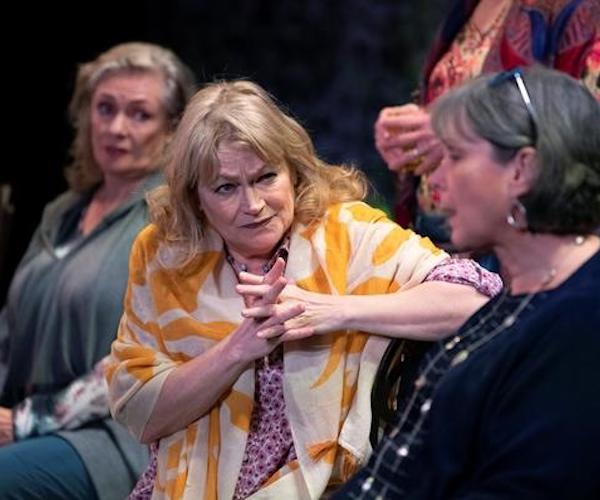Theater Review: “Escaped Alone” and “Come and Go” — Forms of Disconnection
By Mary Paula Hunter
To be truly effective black humor must have us laughing at something we fear, regret, or at the very least recognize.
Escaped Alone by Caryl Churchill with Come and Go by Samuel Beckett. Directed by Tony Estrella. Staged by the Gamm Theatre at 1245 Jefferson Boulevard, Warwick, Rhode Island, through March 17.

(l to r) Marya Lowry, Karen MacDonald, and Carol Dewes in the Gamm Theatre production of “Escaped Alone.” Photo: Karl Dominey.
Like its title, Caryl Churchill’s slightly dystopic 2016 play Escaped Alone is intentionally vague. From the moment Mrs. Jarrett (Debra Wise), the proverbial disruptive visitor, enters the world of three 70-year-old long time friends, we sense what might be coming — the potential undoing of a friendly ritual, such as a coffee clatch. Or, in this case, because the setting is England, a tea party. But Churchill’s uninvited guest wrecks no havoc and, on top of that, the three old friends learn nothing new about each other — as is so often the case in stereotypical dramas centered around a get-together.
Instead, Escaped Alone (which is receiving its New England premiere) is a strange and unsatisfying mix of whimsy and black humor, with the latter’s intimations of horror taking place in an overlit backyard, replete with tea cups and a never ending supply of tea poured from a lovely pot. The play begins with the entrance of Mrs. Jarrett, the peeping disruptor, here characterized as a guileless gentle soul. Lowering her umbrella on this rain-free afternoon, she gladly joins the all-girls affair. Her little swag indicates that they’re lucky to have her. Before long, and at regular intervals, this uninvited guest steps forward and, as the other characters freeze, describes her spontaneous visions of catastrophes. The surreal quality of these monologues is heightened by the fact that her descriptions of a rock slide, a toxic spill, fire, and famine are delivered via an outrageous apocalyptic language. She reports in a disconcerting monologue that the rock slide targets the faces of individual children One of the toxic spill’s consequences is that the number of birth deformities outstrips the yearly immigration of plastic surgeons.
Funny, right? Well, sort of. To be truly effective black humor must have us laughing at something we fear, regret, or at the very least recognize. Churchill’s little backyard gathering of retirees is a bizarre confab disconnected from the prosaic — at least for the most part. Sally (Karen MacDonald) has a violent fear of cats. She may suffer from bouts of delusional thinking, but for most of the play she’s the voice of reason. Vi (Marya Lowry) stabbed her husband with a kitchen knife — and regrets exposing her son to so much blood. On top of that, the whole affair left her leery of kitchens. Lena (Carol Dewes) suffers from crippling depression and agoraphobia; she is often so miserable she can’t leave her home. Her suffering feels like the token strain of psychological verisimilitude amidst the unreal stories and hysteria of her two friends.
Occasional broadcasts of important news — often hard to make out — add another layer of unreality to that of Mrs. Jarrett’s disaster monologues and the absurdity of the tea party. Bright, marquee style lighting frame these “you are there” moments, a stagey device that eventually becomes gimmicky and predictable.
Nothing adds up and this may be Churchill’s point. The play ends rather than concludes with the actors walking into the house from the garden, an action that provides a seamless transition to Come and Go, Samuel Beckett’s 1965 play of three aging women seated on an bench in face-obscuring bonnets and cumbersome dresses. Featuring figures with stiff spines and crossed arms — like the Little Swans of Swan Lake — this brief play feels like a painting, or a ritualized dance.
Just as abstract (or more so) than Churchill’s script, Beckett’s excursion into absurdity is far more powerful because of its brevity and poetic concision. Escaped Alone is filled with myriad examples of disparity and disconnection; Beckett explores the fragility of human interaction by choreographing a short “dance” of three old school chums who enter and exit the bench in a rotating order. Each changes position, perhaps jockeying for power or searching for meaning as they whisper, and repeat in low voices, that they see little change in each other.
Mary Paula Hunter lives in Providence, RI. She’s the 2014 Pell Award Winner for service to the Arts in RI. She is a choreographer and a writer who creates and performs her own text-based movement pieces.
Tagged: Caryl Churchill, Come and Go, Escaped Alone, Gamm-Theatre

I had the pleasure of seeing this funny and intelligent play on Wednesday night. (And enjoyed the off-the-charts acting that this review never mentions.) Ms. Hunter clearly missed the point of this production. Furthermore, she undermines the validity of her argument when she inaccurately describes details, like the costumes for the Beckett play, which were straw sun hats, not bonnets, and clearly trench coats, not dresses. Also, the actor playing Lena is Carol Drewes, not Dewes.